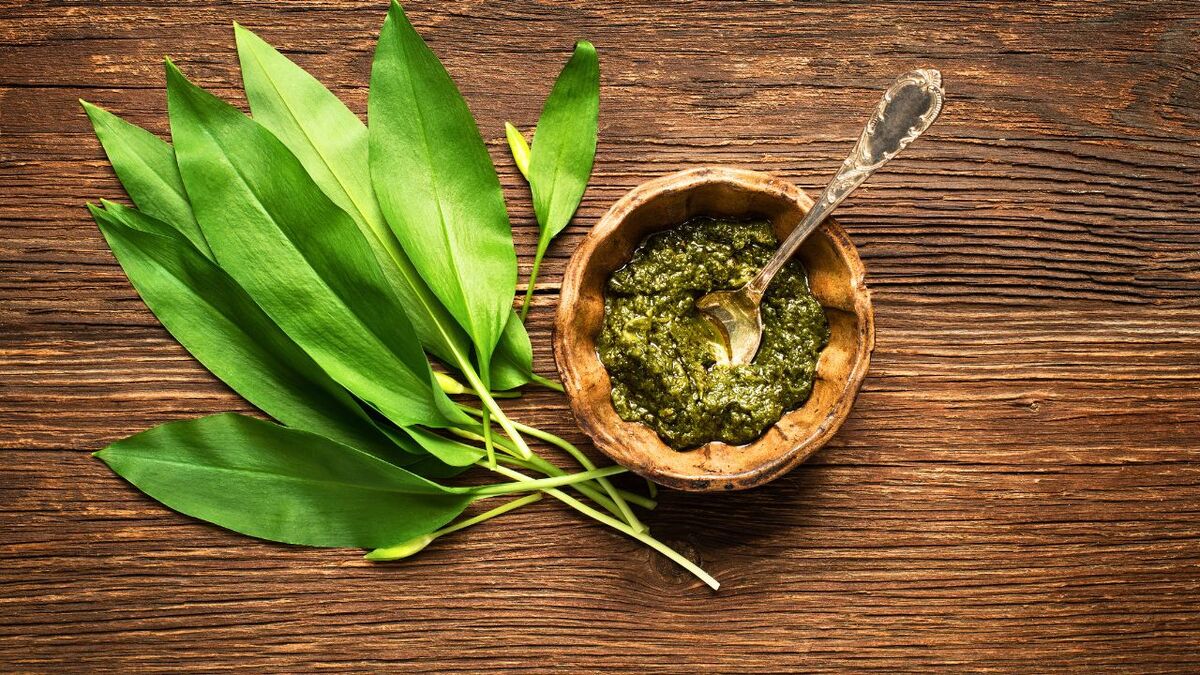
Wild garlic: Identifying, Gathering, Harvesting and Utilizing - Tips and Recipes
👉 The key facts from this guide
- Learn to safely identify wild garlic and distinguish it from toxic look-alikes like lily of the valley and autumn crocus.
- Enjoy the health benefits of wild garlic such as vitamin C, minerals, and antibacterial properties.
- Use wild garlic in various ways in pestos, soups, spreads, pasta, and more - try out over 30 delicious recipe ideas.
- Preserve excess wild garlic by freezing, storing in oil, or making pesto and enjoy it all year round.
- Use my tips and tricks to neutralize the garlic smell on your hands or breath after consuming wild garlic.
His spicy garlic scent gives him away from afar. March to May is the best time to collect this green delicacy.
I often walk in semi-shady deciduous forests, look at damp meadows, or along streams. There, the wild garlic hides with its vibrant green leaves.
But beware, there is one thing - the risk of confusion.
Wild garlic looks very similar to the poisonous lily of the valley and autumn crocus. I have learned to look closely and recognize the difference.
I want to show you this today. Because when used correctly, wild garlic is not only delicious, but also healthy.
It is full of vitamin C, magnesium, and iron. So, it is ideal for strengthening our bodies during adventures in the wilderness.
Properties and Identification Features of Wild Garlic
Identifying wild garlic is like an adventure in the forest - exciting and sometimes challenging. It has broad, green leaves that smell like garlic.
It is widely spread throughout most of Europe, but grows mainly in the south of Germany. In the north, it is even partially threatened with extinction. Nevertheless, wild garlic is not protected by law.
Preferred Growth Locations
Wild garlic feels most comfortable where it is moist and shady. That's why it is often found in floodplain forests, mixed deciduous forests, and ravine forests. It also thrives along streams and in spring areas.
The ideal soil for wild garlic is nutrient-rich, rich in lime, and loose.
He likes it a bit clayey to sandy. Waterlogging is not well tolerated, so the soil should be well-draining.
In deeper, shadier areas, wild garlic typically spreads extensively, forming a dense green carpet. Light beech forests are a paradise for it. Here, in spring, one can often admire entire wild garlic seas.
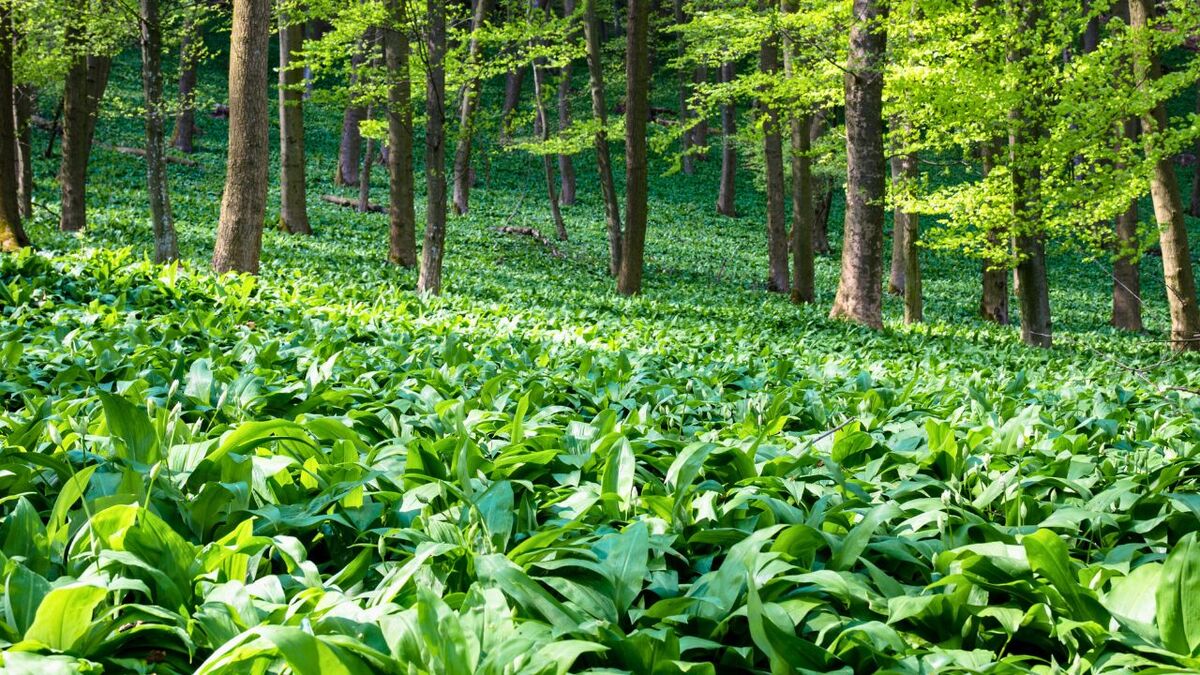
Tip: When collecting, make sure not to choose locations directly on paths or at the edges of forests. Leaves there may be contaminated by dog feces or exhaust fumes. It's better to venture a few steps deeper into the forest.
Growth Phases and Blooming Period
I love to wander through a primeval forest and explore nature. There I often find wild garlic, a plant with many faces.
Let's first take a look together at its growth phases and flowering period.
Spring Awakening - March
- The snow is melting, the ground is thawing. Now begins the season of wild garlic.
- Small, robust green leaves are pushing through the earth. They are hungry for sunlight.
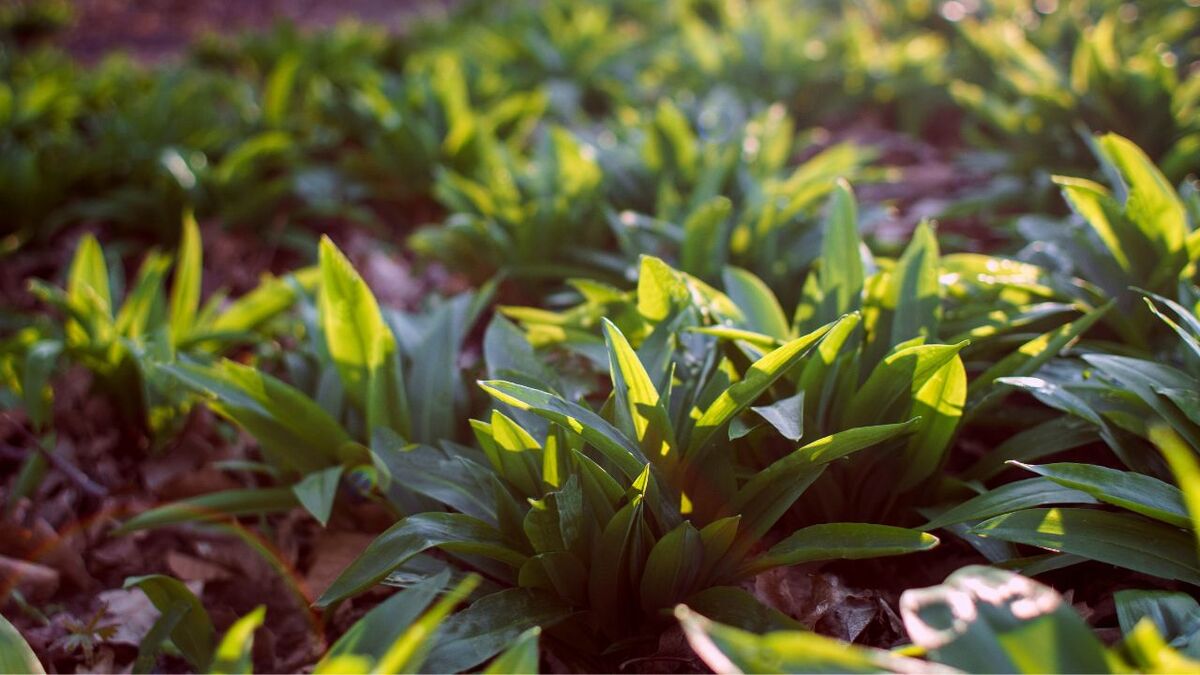
Sea of Leaves - April
- The forest transforms into a green sea. The wild garlic leaves are now big and juicy.
- Ideal for those who collect in their garden or in the wild. But beware of confusion!
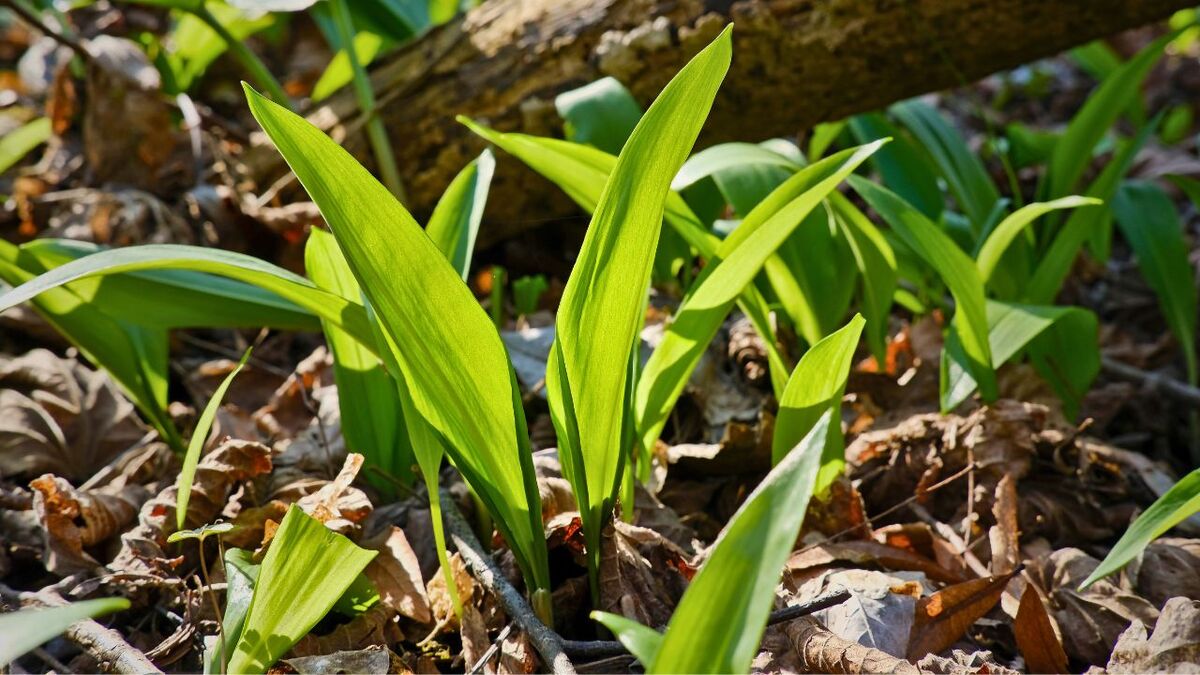
White Beauty - May
- Surprise! White star flowers now adorn the wild garlic. The signal: The best time for picking is coming to an end.
- After flowering, the plant focuses its energy on seed formation.
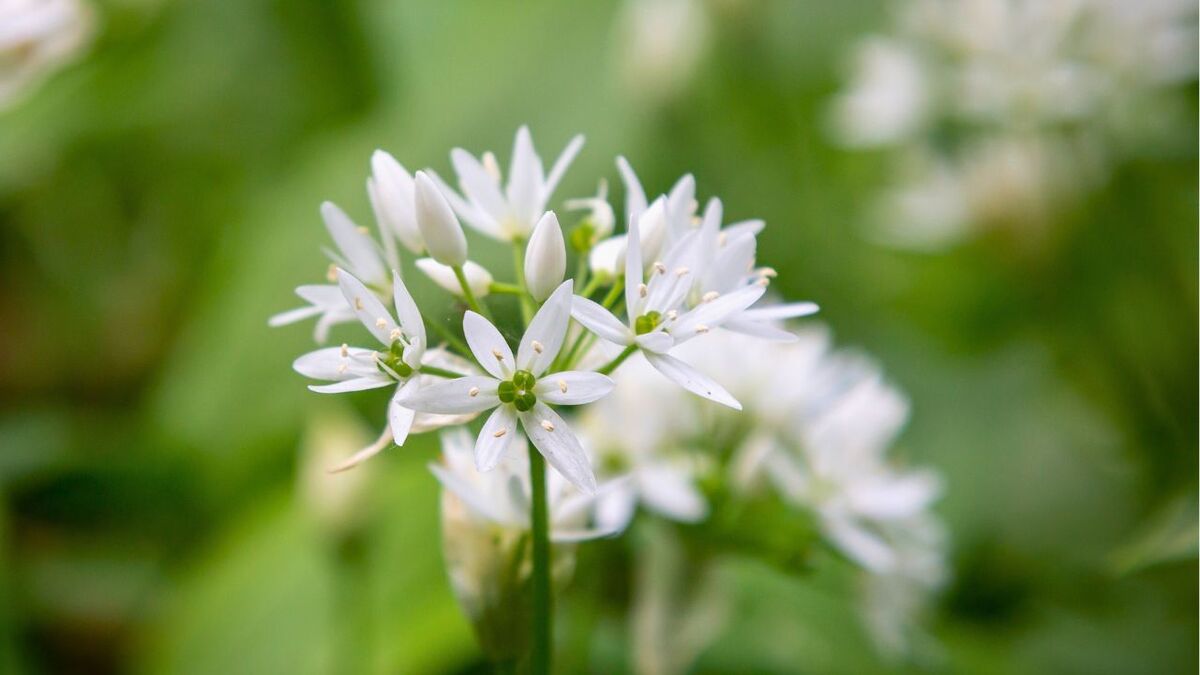
Spread and Occurrence in Nature
Wild garlic reproduces both through seeds and vegetatively through daughter bulbs.
The seeds are often carried away by ants - a phenomenon called "myrmecochory".
The distribution area of wild garlic extends across large parts of Europe and reaches as far east as Asia Minor. It occurs from the plains to the middle mountain regions, and in the Alps it can even be found up to 1900 m in altitude in isolated cases.
The focus in Germany is in the south and in the center. In the lowlands of northern Germany and along the coast, wild garlic is often sought in vain. It is too cold and too dry for it there.
Even in the intensively used agricultural landscape, wild garlic hardly finds suitable growing sites anymore. As an indicator species for untouched deciduous forests, it is therefore becoming increasingly rare in some places. In some regions, it is already on the watch list of endangered species.
It is all the more important to handle the stocks with respect. Collect in moderation and mindfully, so that the wild garlic can continue to spread and remain with us for a long time.
Leaf shapes and fruit development of wild garlic
Wild garlic leaves have their charm. They usually grow individually on a thin, long stem, making them easily recognizable.
This detail is worth its weight in gold, as it helps to distinguish wild garlic from its toxic look-alikes (more on that below).
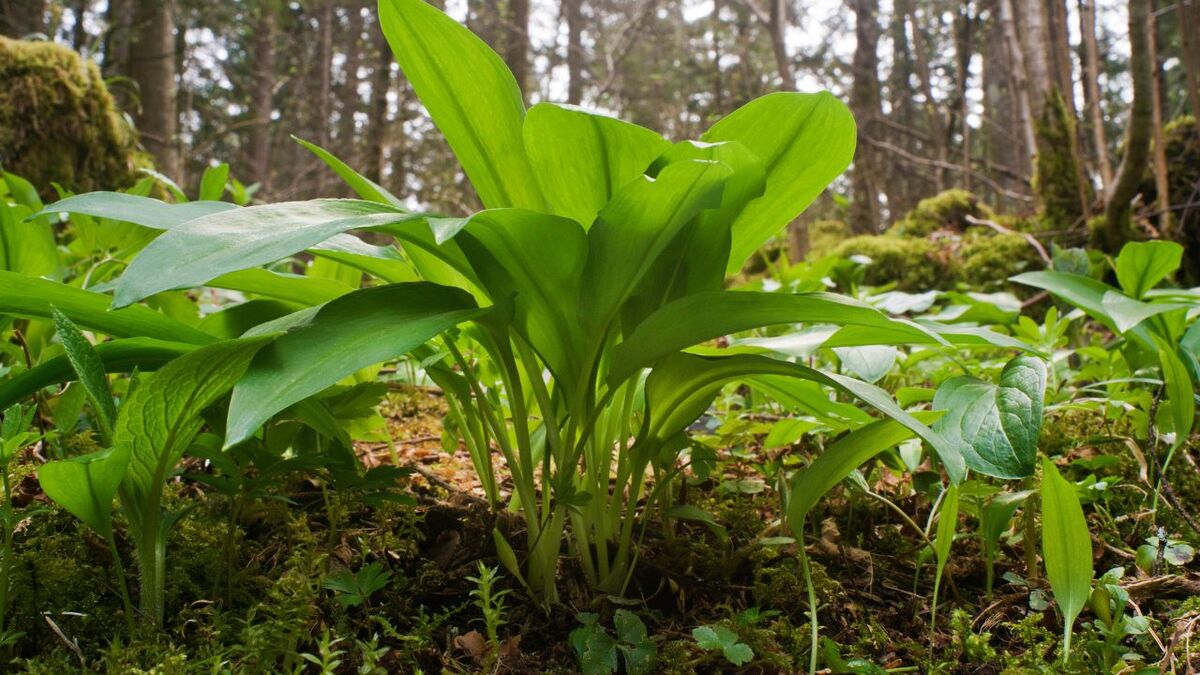
Another feature is the rich green color of the leaves, which shines vividly in the semi-shady deciduous forests where wild garlic likes to grow.
Your spicy garlic scent gives it away as soon as you crush the leaves between your fingers.
This scent is a gift from nature and makes collecting a sensual experience.
Now onto the fruit formation: After the flowering period, the beauty of the white flowers transforms into small, inconspicuous seed capsules. These capsules contain the seeds with which wild garlic reproduces for the next year.
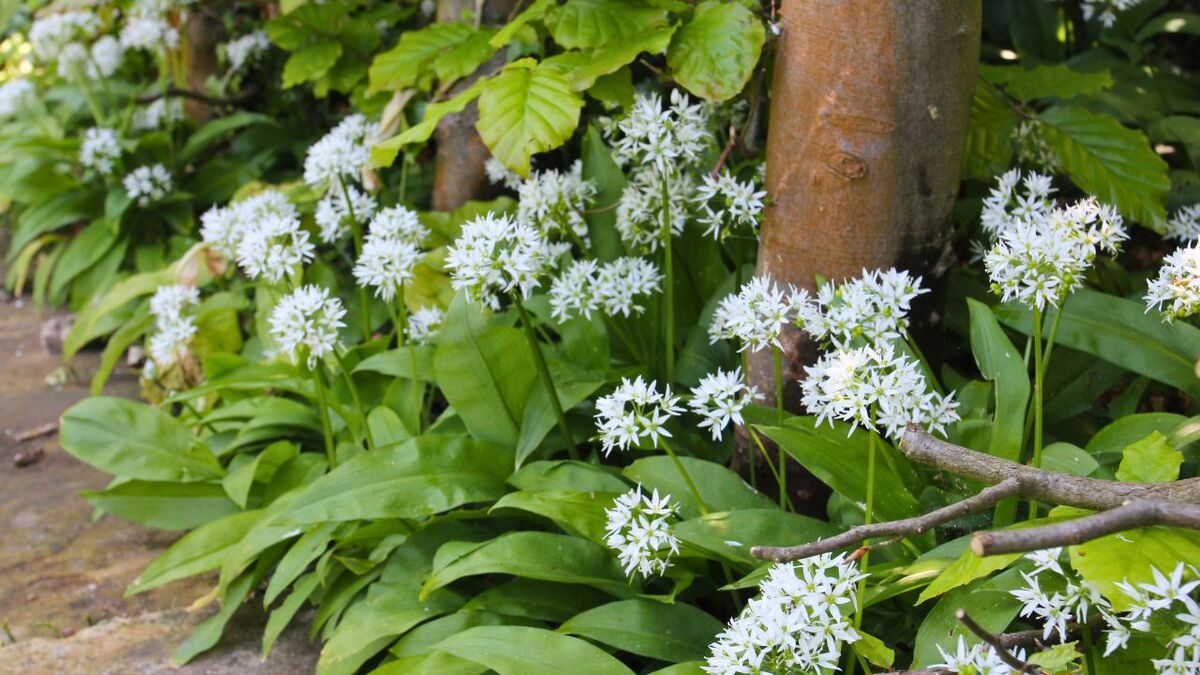
It is exciting to observe how delicate flowers turn into solid seeds that can fall directly into the ground to germinate there.
This phase of nature clearly shows us how the cycle of life works - a constant renewal.
Distinguishing Features and Confusion Risk When Collecting Wild Garlic
Collecting wild garlic requires caution - especially when you are a beginner.
The green leaves closely resemble those of lily of the valley and autumn crocus ... and these plants are poisonous. It's easy to mistake them for the wrong plant.
However, with the right know-how, you will recognize wild garlic immediately: A strong garlic scent when crushing the leaves is a good sign.
But this is also a problem. Once your hands smell like garlic, every other plant will smell like garlic too when you hold it in your hands.
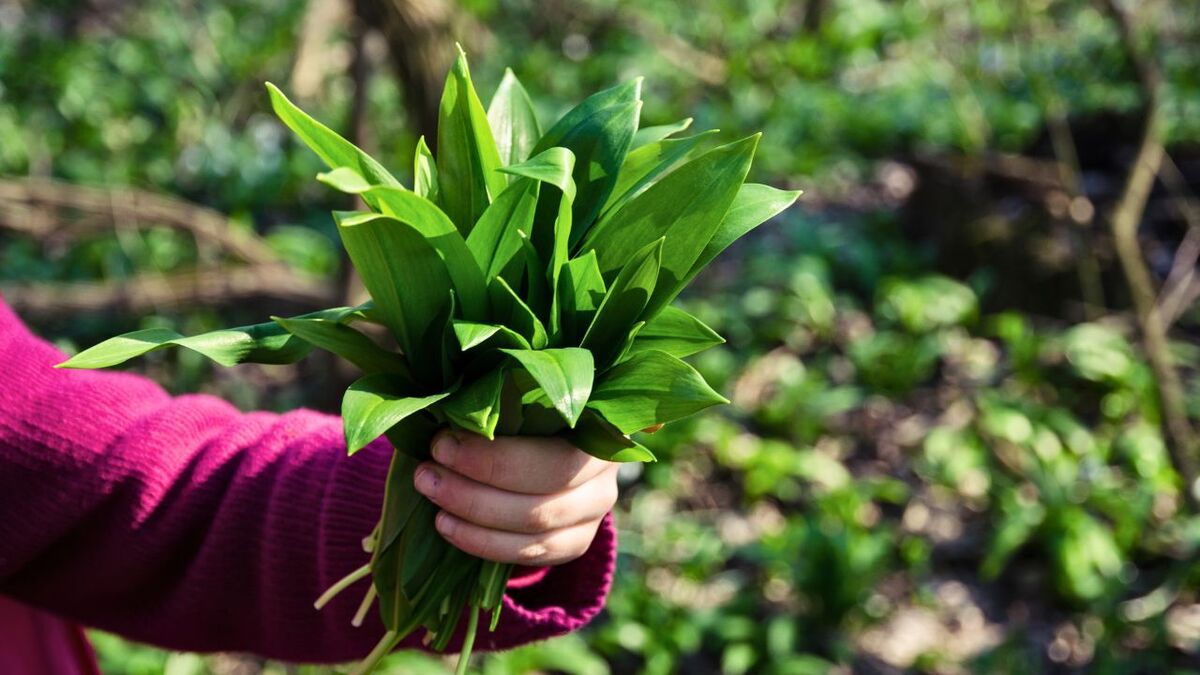
Distinguishing Toxic Lookalikes
Imagine sitting in front of a steaming plate of wild garlic pasta, the aroma tickling your nose, making your mouth water.
You take the first bite and think to yourself: Wait a minute, this tastes kind of bitter!
Oops, that might actually be the dreaded poison dumplings pasta alla Lily of the Valley! 😨
No need to worry, it doesn't have to go that far. I'll tell you how to expose the green villains.
1. Wild garlic usually emerges from the ground with a single leaf, surrounded by an onion-like sheath. Later, 2–3 leaves may also appear.
So if you see a plant that greets you with a bush full of greetings, stay away. It is likely to be the autumn crocus (which has a rosette) or the lily of the valley.
1️⃣ Lily of the valley always has two leaves on one stem, which merge at the bottom into a brownish, scaly sheath. At the base, there is an underground shoot with roots, but no bulb.
2️⃣ The autumn crocus has several leaves (similar to a tulip) arranged around 120° apart. Sometimes there is a fruit ovary at the base.
3️⃣ The cuckoo pint has leaf veins radiating in a net-like pattern from the midrib (net venation), which distinguishes it structurally from wild garlic.
2. The upper side of the leaf is shiny green, the underside of the leaf is matte. Wild garlic has matte leaves underneath, whereas lily of the valley shines like freshly polished silver.
3. Wild garlic smells like garlic. But be careful! After collecting wild garlic, your fingers will smell like garlic and most likely other leaves you have in your hand.
4. Wild garlic has drooping leaves. The leaves of Lily of the Valley stand upright in particular.
5. Wild garlic leaves are significantly thinner and softer than the leaves of autumn crocus and lily of the valley. The latter have thicker, firmer leaves.
6. When breaking or bending the wild garlic leaves, a quiet cracking sound can be heard. The leaves of the impostors are more elastic and return to the same position as before after bending.
7. Wild garlic leaves have an arcuate venation. This means that there are additional veins running around the midrib that do not touch the midrib. This feature distinguishes wild garlic from cuckoo pint, but not from the toxic lookalikes Lily of the Valley and Autumn Crocus.
Attention: Smell is not an indicator!
The smell of garlic is a good first clue, but not sufficient on its own. The leaf shape and growth form are crucial for a clear identification.
Wild garlic leaves grow individually on the stem directly from the ground. They are thinner and softer than the leaves of the impostors. Lily of the valley and autumn crocus have thicker leaves that grow in tufts from a leaf sheath or an underground shoot.
So check each plant individually and pay attention to these characteristics. Only then can you identify wild garlic safely.
If you are unsure, stay away! Only collect what you are absolutely certain is wild garlic. Better to forgo the wild pleasure than to risk poisoning.
A video that I can recommend to you:
Collecting Tips and Sustainable Harvesting
I love to roam through the forests and collect wild garlic. I always make sure to handle nature with care.
I would like to give you a few tips:
- Always pick individual leaves, never the whole plant! This ensures that the wild garlic can grow vigorously again next year. I usually take 2-3 leaves per plant - that's enough for a delicious meal and leaves plenty for the next season.
- Only gather as much as you really need and can use. That's my motto when collecting wild garlic. Harvesting in moderation preserves the stocks and allows others to enjoy the wild garlic as well.
- The optimal harvesting time is just before flowering, usually in April. At this point, the leaves are nice and large, juicy, and have not lost their flavor. Once the first white flowers appear, I stay away. Because now the plant needs all its energy for seed formation.
With these simple rules, you can sustainably collect wild garlic and protect nature at the same time. This way, this delicious wild herb will remain available to us for a long time.
Health Aspects and Ingredients
Wild garlic is not only delicious, but also really healthy!
Our ancestors already knew about its healing effects. Hildegard von Bingen recommended it as early as the 12th century for digestive problems and blood purification.
But what makes wild garlic so valuable?
There are the antibacterial and anti-inflammatory properties. They strengthen our immune system and help the body fight off pathogens.
Vitamin C is another trump card that wild garlic holds. With 150 mg per 100 g, it even surpasses citrus fruits.
I love making myself a fresh wild garlic salad with other herbs in spring - it definitely keeps me energized throughout the day!
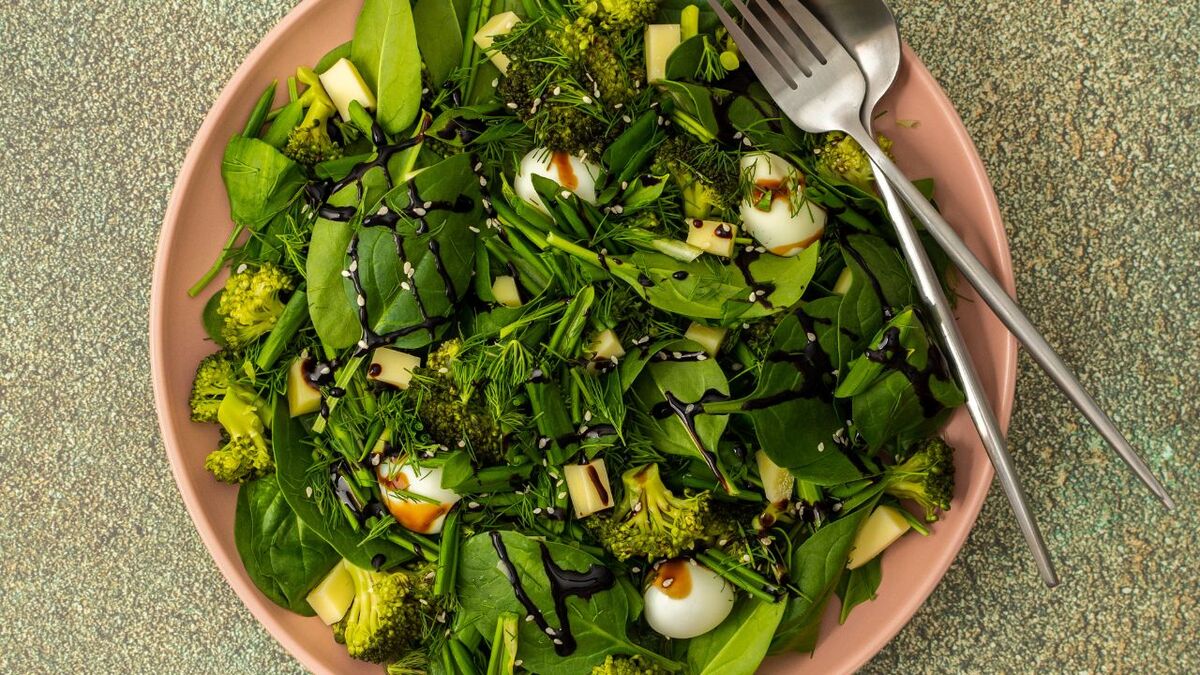
The green wild herb is also not lacking in minerals. Especially iron is abundant.
In combination with vitamin C, our body can absorb and utilize it optimally. This way, wild garlic supports blood formation and prevents fatigue.
Wild garlic not only strengthens the immune system, but is also said to have positive effects on digestive problems, high cholesterol, and high blood pressure.
However, as is so often the case: The dose makes the poison.
Excessive consumption of wild garlic can irritate the stomach and cause discomfort.
My recommendation: Enjoy it in moderation and listen to your body. Then you can fully enjoy the benefits.
Or as my grandma always used to say: "A little bit of everything, more of some, and of wild garlic until the belly button smells like garlic!" 😉
Processing and Preparation of Wild Garlic
Finally, the harvest has been brought in, and the wild garlic is waiting to be processed.
But wait, not so fast!
First, it says: wash thoroughly and dry.
This is how you remove dirt, small insects, and potential germs. I place the leaves in a sieve and rinse them under running water. Then I spread them out on a clean kitchen towel and gently pat them dry.
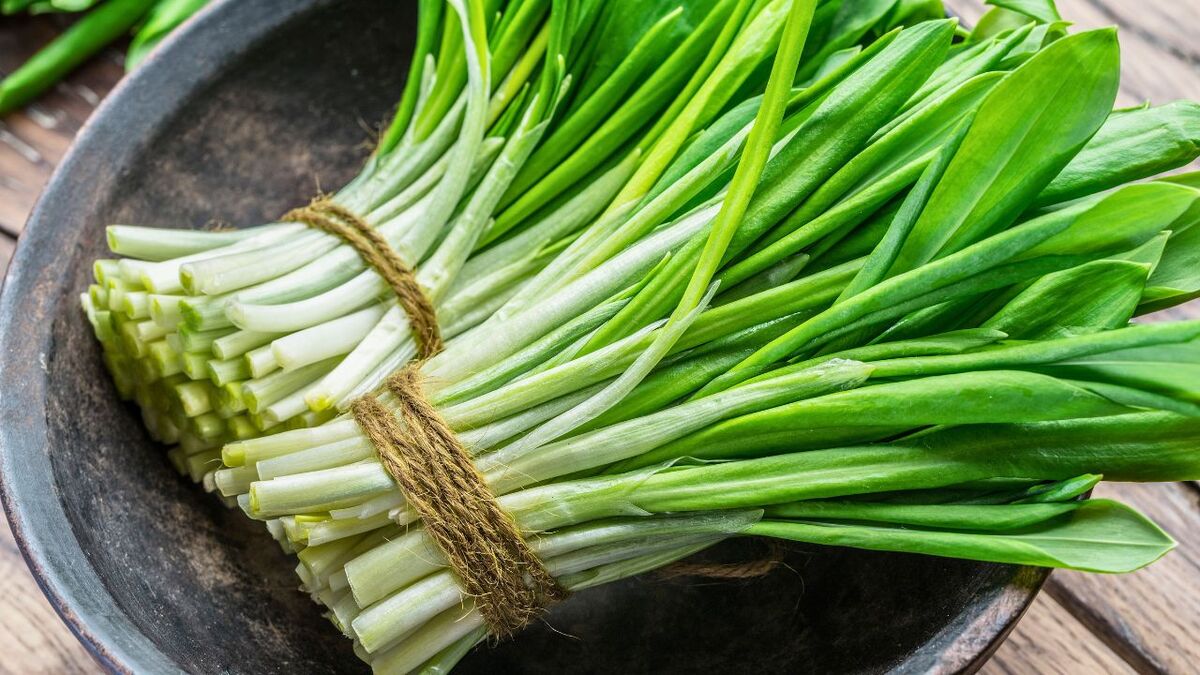
Wild garlic tastes best when fresh. That's why I prefer to process it right after harvesting. This way, the valuable nutrients and full flavor are preserved.
The possibilities of preparation are diverse.
Raw chopped refined wild garlic salads, dips, and spreads. Cooked it gives soups, sauces, and vegetable dishes a special touch.
However, my absolute favorite is wild garlic pesto.
Then I mix the leaves with olive oil, Parmesan, pine nuts, and a little salt. A dream with pasta or as a dip!
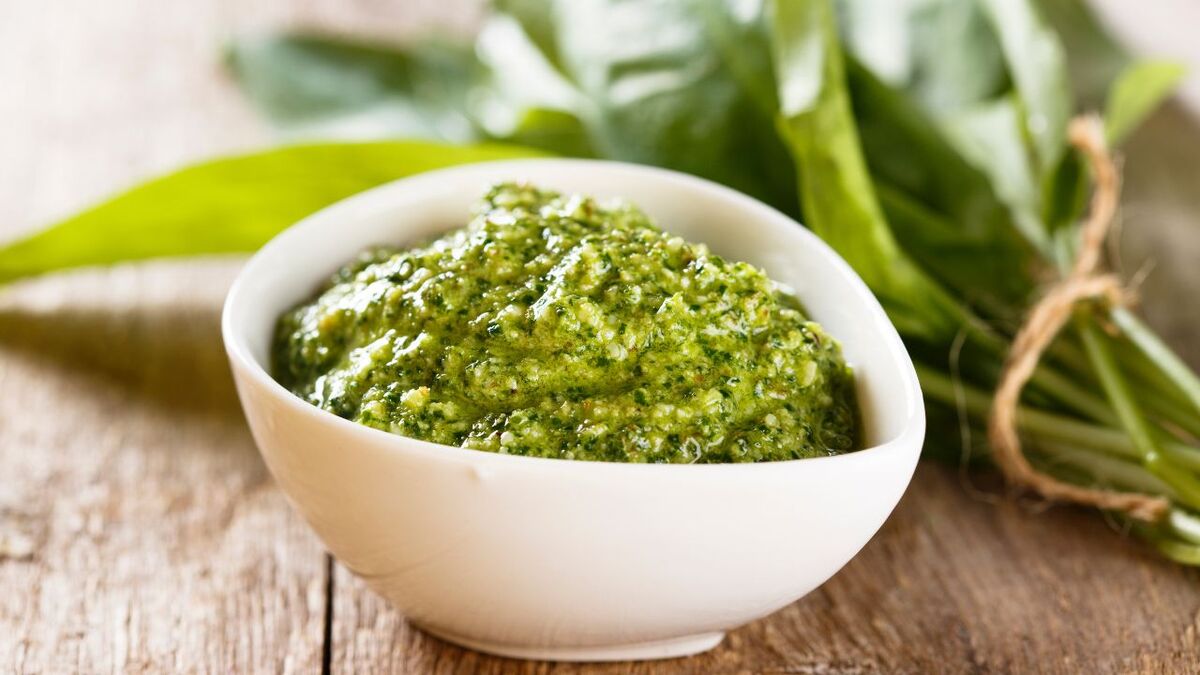
Furthermore, Wild garlic butter is also a hit. Simply mix soft butter with finely chopped wild garlic and shape it into a roll. Perfect for enhancing fish or potatoes.
One more tip: Wild garlic pairs perfectly with mild, neutral ingredients. They allow its flavor the necessary space to unfold. "Less is more" - this also applies when seasoning with wild garlic.
Important: To eliminate possible fox tapeworm eggs as well as other insects, you should always wash the wild garlic thoroughly before processing.
But don't panic - the risk is really very low. You have better chances of being struck by lightning while riding a unicorn and playing the lottery. So, let the water flow and get to the wild garlic! (A lightning strike on a person happens only 300 to 400 times a year in Germany. Source 1 and Source 2.)
Pickling and Storage of Wild Garlic
Wild garlic is unfortunately quite a seasonal artist - it shines for a few weeks on the big forest stage and then disappears faster than some C-list celebrity from the jungle camp.
But don't worry, I have a few tricks up my sleeve on how to ensure you can enjoy wild garlic all year round.
Freezing
The easiest way to do this is by freezing. I wash and dry the leaves, chop them roughly, and fill them into freezer bags. This way, they stay fresh until the next season.
Extra tip: Fill puréed wild garlic in ice cube trays and freeze it in portions. This way, you always have exactly the amount you need on hand.
If you prefer it in portions, fill the chopped wild garlic with some water or oil into ice cube trays. The frozen cubes go into a bag - and there is your wild garlic supply ready!
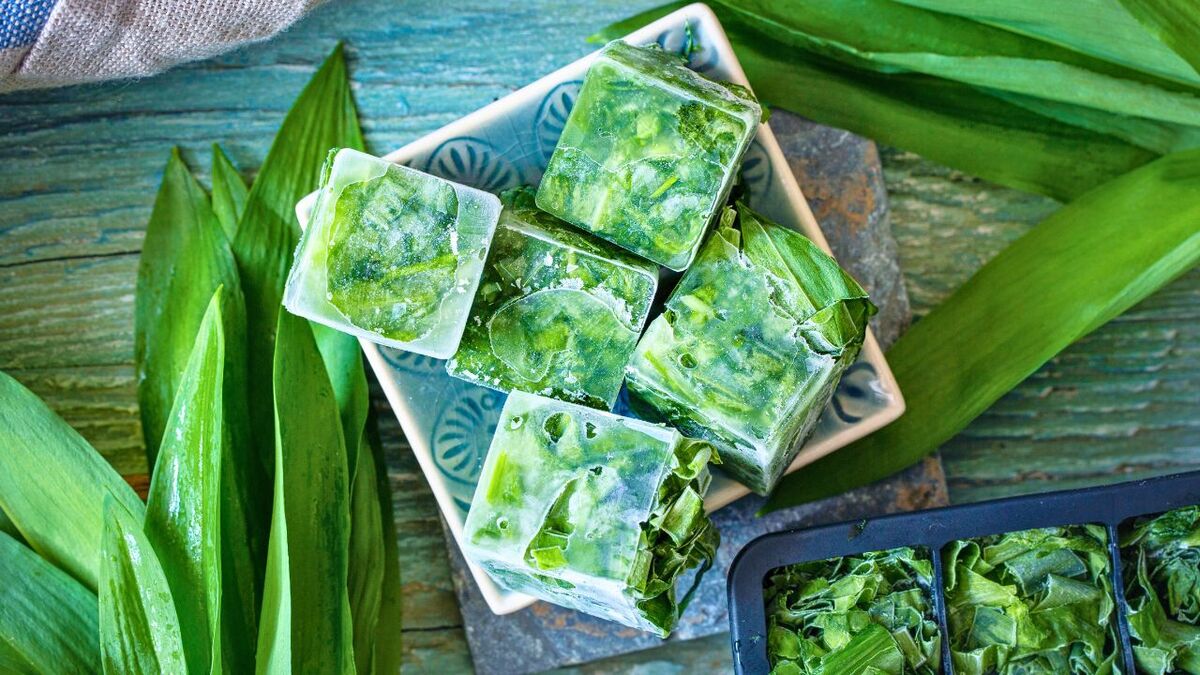
Marinating in Oil
Pickled in oil, wild garlic is also long-lasting, easily 1–2 months. To achieve this, layer the clean, dry leaves in a jar, cover with olive oil, and seal tightly. Stored in a dark and cool place, the flavor will be preserved.
Pesto is my favorite way to preserve wild garlic. It keeps well in the fridge for several weeks and instantly enhances dishes. The oil keeps it nice and smooth.
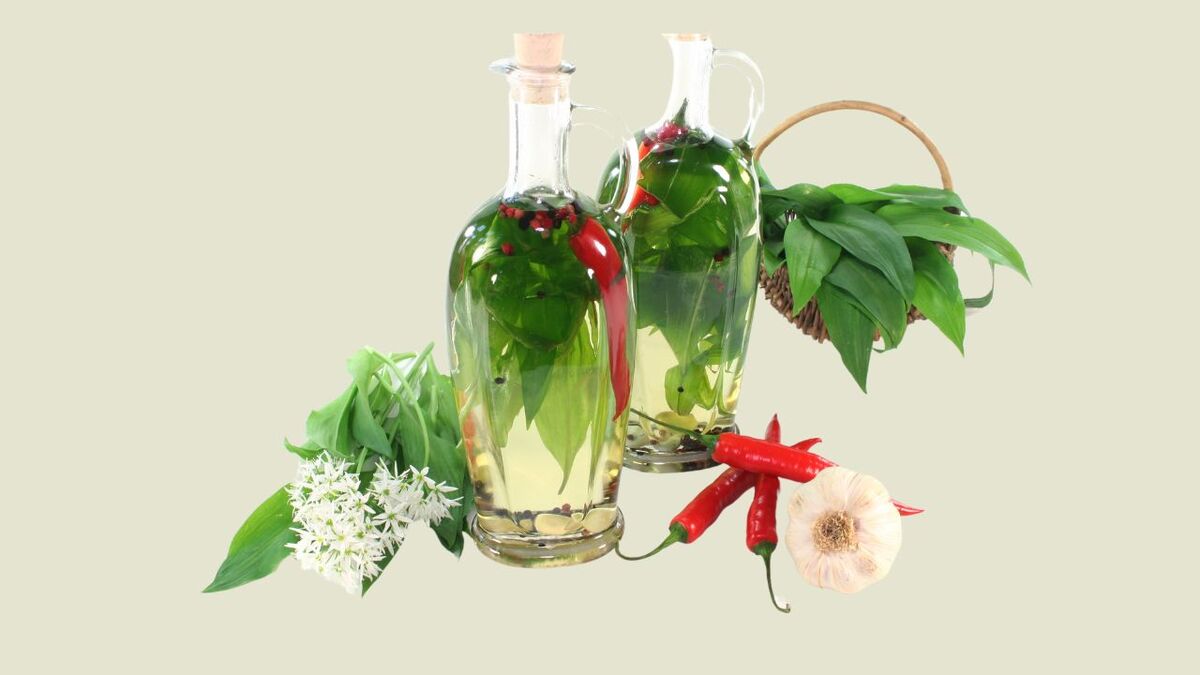
Processing into Salt
Wild garlic salt is an aromatic alternative for the salt mill. Mix the wild garlic with salt in a mortar until the salt turns green, and the flavor has transferred.
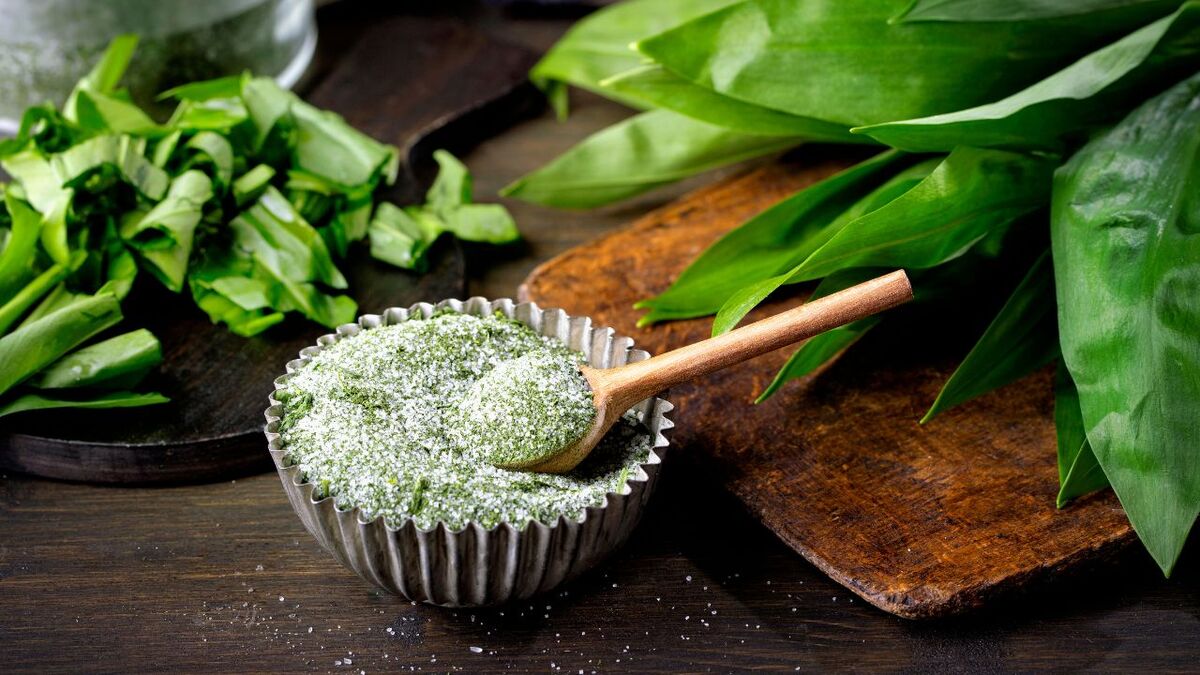
A secret tip at the end: Freezing wild garlic butter. To accomplish this, cut the finished herb butter into slices, wrap it in cling film, and put it in the freezer. This way you have spring in convenient portions in stock.
By the way: Freshly collected wild garlic will keep in the refrigerator for about 3 days. Unfortunately, much of its aroma is lost through drying.
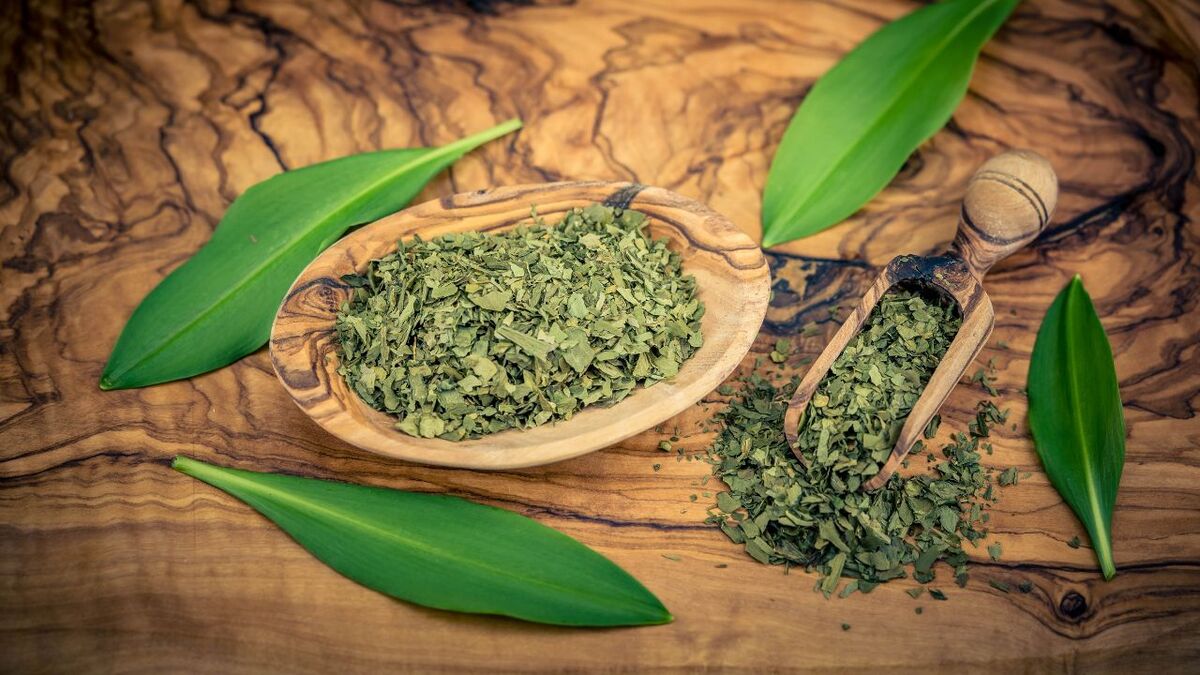
My Wild Garlic Recipe List (30 Recipes)
My recipes showcase the versatility of wild garlic in the kitchen. Whether as a main ingredient or as a flavorful addition - wild garlic adds a special touch to many dishes.
Ingredients:
- 100 g wild garlic leaves
- 50 g pine nuts
- 50 g Parmesan cheese
- 150 ml olive oil
- Salt
- Pepper
Preparation:
- Wash and dry wild garlic
- Put all ingredients in a blender and process to a homogeneous mass
- Season with salt and pepper
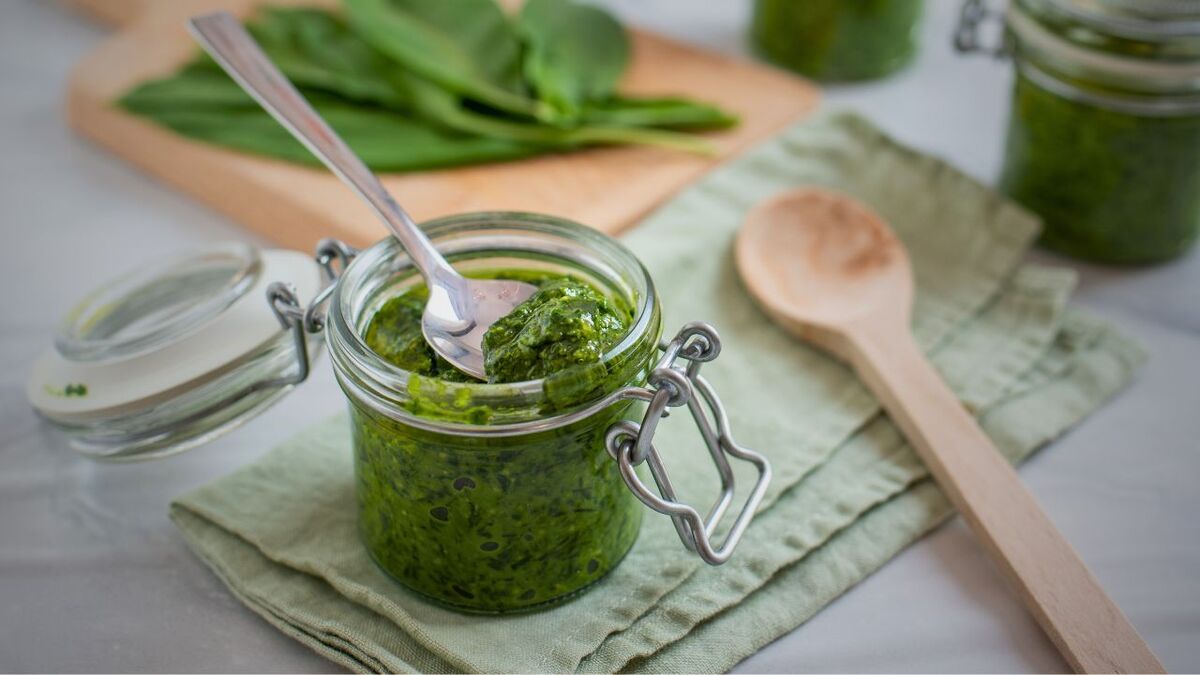
Ingredients:
- 200 g wild garlic leaves
- 1 onion
- 2 potatoes
- 500 ml vegetable broth
- 100 ml cream
- Salt
- Pepper
Preparation:
- Peel onions and potatoes and cut into pieces
- Wash and roughly chop wild garlic
- Sweat onions in oil, add potatoes and wild garlic, deglaze with broth
- Simmer for 15 minutes, then purée
- Stir in cream, season with salt and pepper
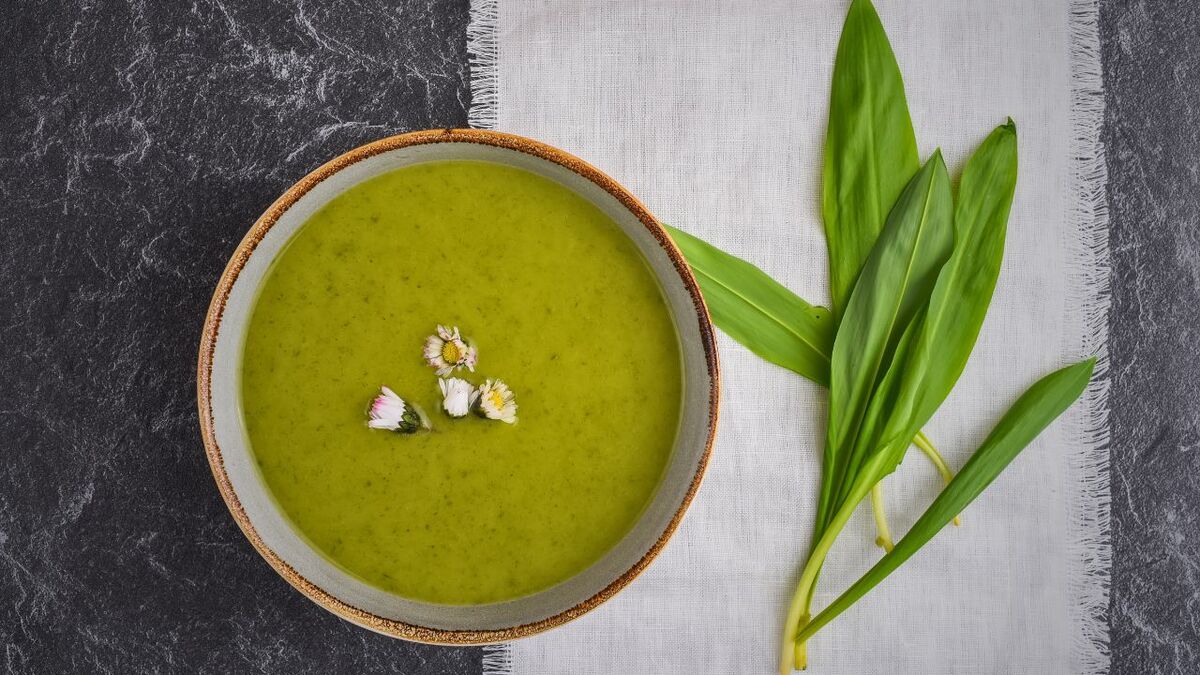
Ingredients:
- 200 g soft butter
- 50 g wild garlic leaves
- Salt
- Pepper
Preparation:
- Wash, dry and finely chop wild garlic
- Mix butter with wild garlic, salt, and pepper
- Shape butter into a roll using foil and refrigerate
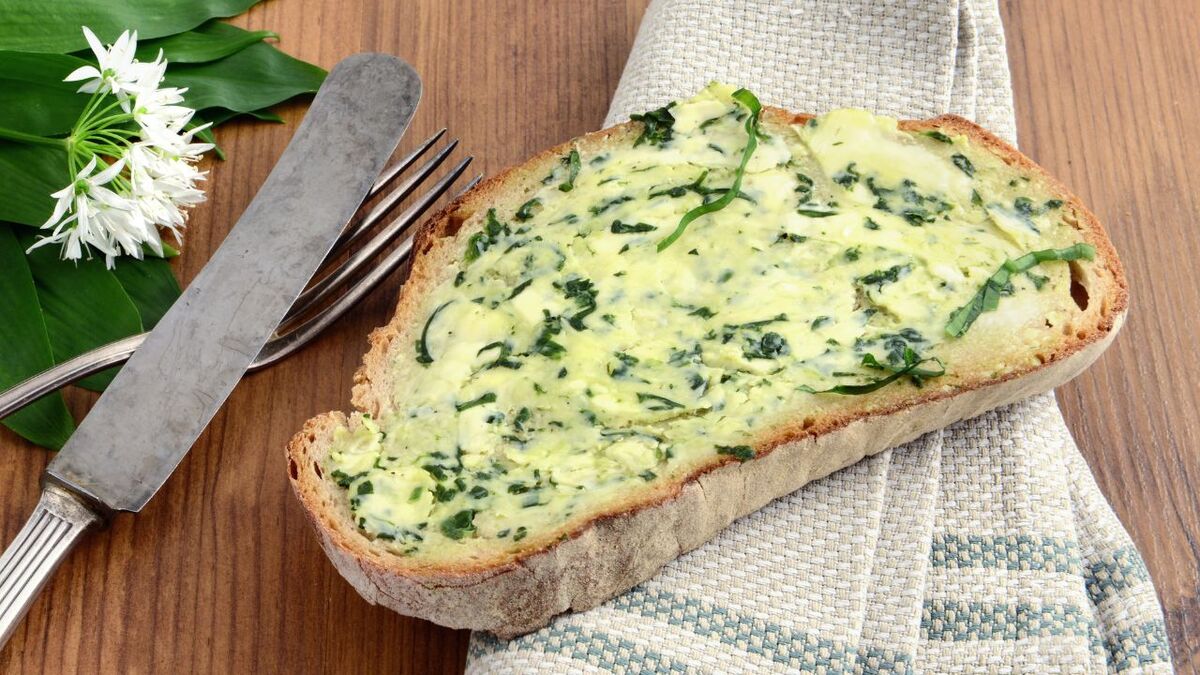
Ingredients:
- 250 g flour
- 3 eggs
- 50 ml water
- 1 pinch of salt
- 50 g finely chopped wild garlic
Preparation:
- Put flour in a bowl, form a well in the middle
- Whisk eggs, water, and salt and gradually mix with the flour
- Knead in the wild garlic
- Scrape Spätzle into boiling salted water, let simmer for 2–3 minutes
Ingredients:
- 300 g risotto rice
- 1 l vegetable broth
- 150 ml white wine
- 2 shallots
- 50 g butter
- 50 g Parmesan
- 100 g wild garlic leaves
Preparation:
- Fine dice shallots and sweat in butter
- Add rice and let it turn translucent
- Deeglaze with wine
- Gradually mix in broth while stirring constantly
- Wash, dry, chop wild garlic
- Stir in wild garlic 5 min before finishing
- Stir in butter and Parmesan
- Season with salt and pepper
Ingredients:
- 1 kg potatoes
- 200 g whipping cream
- 100 g grated cheese
- 1 bunch wild garlic
- Salt
- Pepper
- Nutmeg
Preparation:
- Peel potatoes and slice thinly
- Wash, dry, and slice wild garlic into strips
- Layer potatoes, cream, cheese, and wild garlic in a baking dish
- Season with salt, pepper, and nutmeg
- Bake in a preheated oven at 180 °C for about 45–60 minutes
Ingredients:
- 1 shortcrust pastry
- 150 g wild garlic leaves
- 150 g diced ham
- 125 g grated cheese
- 200 ml cream
- 3 eggs
- Salt
- Pepper
- Nutmeg
Preparation:
- Roll out the dough and place in a quiche form
- Wash, dry, and coarsely chop wild garlic
- Distribute wild garlic, ham, and cheese on the dough
- Whisk cream, eggs, salt, pepper, and nutmeg and pour over
- Bake in a preheated oven at 180 °C for about 45 minutes
Ingredients:
- 500 g stale bread
- 200 ml milk
- 2 eggs
- 1 bunch wild garlic
- 1 onion
- 50 g melted butter
- Salt
- Pepper
- Nutmeg
Preparation:
- Slice bread and soak in milk
- Peel and finely dice onion
- Wash, dry, and chop wild garlic
- Squeeze out bread and mix with eggs, onions, wild garlic, butter, salt, pepper, and nutmeg
- Shape mixture into dumplings
- Cook dumplings in boiling salted water for about 20 minutes
Ingredients:
- 500 g floury potatoes
- 150 g flour
- 1 egg
- 50 g finely chopped wild garlic
- Salt
- Pepper
- Nutmeg
Preparation:
- Cook potatoes in their skins, peel, and press through a potato press
- Add flour, egg, wild garlic, salt, pepper, and nutmeg and knead into a smooth dough
- Form dough into rolls and cut into pieces
- Cook gnocchi in boiling salted water for about 3 minutes
- Ideally then briefly roast in butter
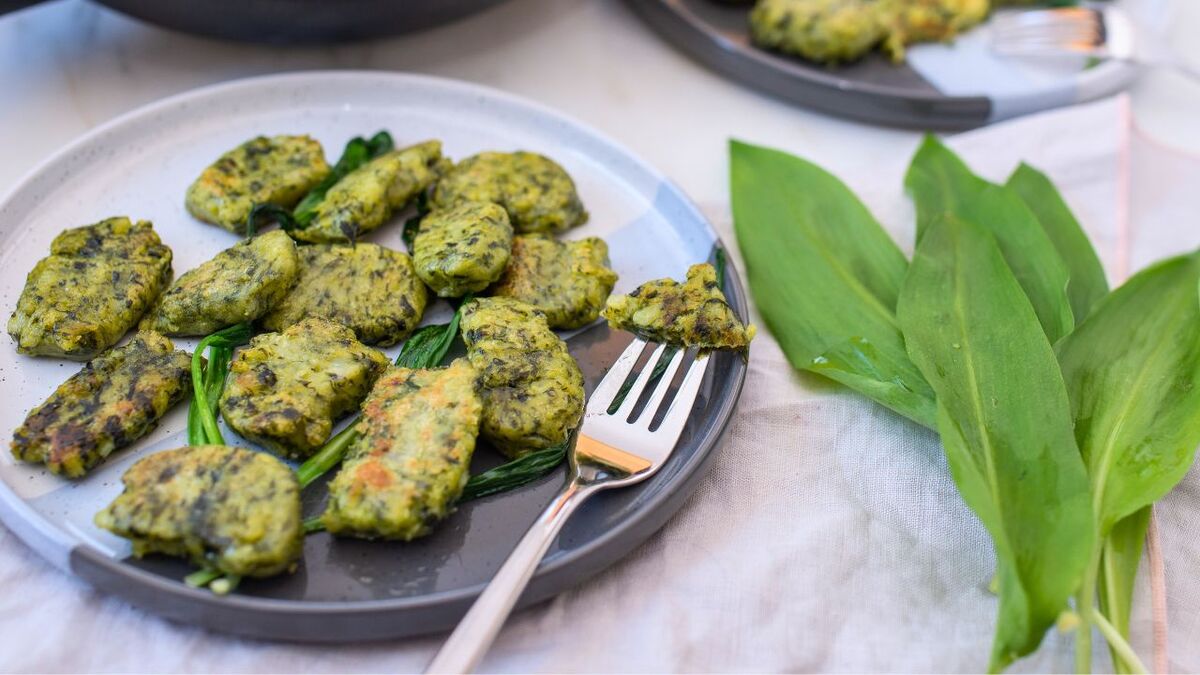
Ingredients:
- 200 g dried chickpeas (1 can is also possible)
- 1 bunch wild garlic
- 1 onion
- 2 garlic cloves
- 1 tsp cumin
- 1 tsp coriander
- 1⁄2 tsp baking soda
- Salt
- Pepper
Preparation:
- Soak chickpeas overnight in water
- Wash, dry, and coarsely chop wild garlic
- Process chickpeas, wild garlic, onion, garlic, cumin, coriander, baking soda, salt, and pepper in a blender to a coarse mass
- Shape mass into small balls
- Fry balls in hot oil
(If you use canned chickpeas, then wash them thoroughly. For the recipe, you must then add 1 egg and breadcrumbs)
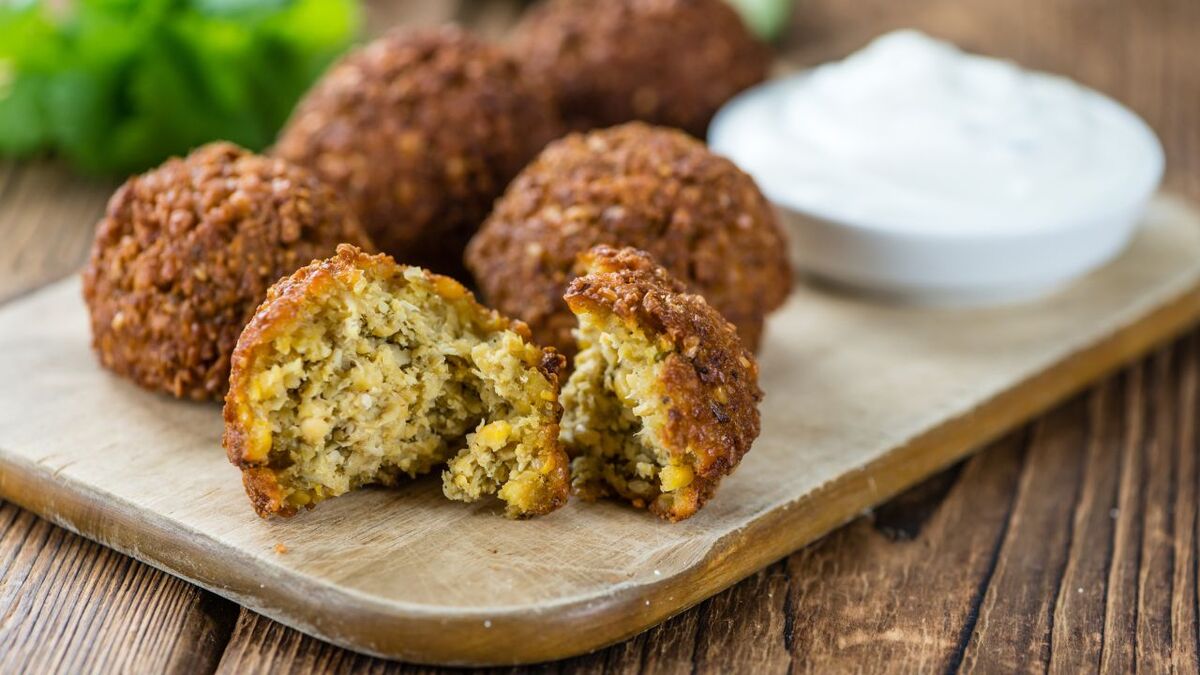
Ingredients:
- 200 g cooked chickpeas
- 1 bunch wild garlic
- 2 tbsp tahini
- 1 lemon (juice)
- 1 garlic clove
- 4 tbsp olive oil
- Salt
- Pepper
Preparation:
- Wash, dry, and coarsely chop wild garlic
- Process all ingredients in a blender to a smooth mass
- Season with salt and pepper
Ingredients:
- 500 g flour
- 1 packet dry yeast
- 300 ml lukewarm water
- 1 tsp salt
- 100 g wild garlic pesto
Preparation:
- Dissolve yeast in water
- Knead flour, yeast, yeast-water, and salt into a smooth dough
- Let dough rise in a warm place for about 45 minutes
- Roll out dough, spread with wild garlic pesto, and roll up
- Place bread on a baking sheet and bake in a preheated oven at 200 °C for about 30 minutes
Ingredients:
- 250 g flour
- 1 tsp baking powder
- 1⁄2 tsp salt
- 50 g cold butter
- 150 g grated cheese
- 1 bunch wild garlic
- 150 ml milk
Preparation:
- Mix flour, baking powder, and salt
- Cut butter into pieces and knead in
- Grate cheese and mix in
- Wash, dry, chop, and mix in wild garlic
- Add milk and knead into a dough
- Roll out dough, cut out scones, and place on a baking sheet
- Bake in a preheated oven at 200 °C for about 20 minutes
Ingredients:
- 1 pizza dough
- 100 g wild garlic pesto
- 200 g mozzarella
- 50 g Parmesan
- 1 handful cherry tomatoes
Preparation:
- Roll out pizza dough and spread with wild garlic pesto
- Slice mozzarella and distribute on the pizza
- Grate Parmesan and sprinkle over
- Halve cherry tomatoes and distribute on the pizza
- Bake in a preheated oven at 220 °C for about 15 minutes
Ingredients:
- 6 eggs
- 50 ml milk
- 1 bunch wild garlic
- 50 g butter
- Salt
- Pepper
Preparation:
- Whisk eggs with milk
- Wash, dry, and chop wild garlic
- Melt butter in a pan
- Pour egg mixture into the pan and let set
- Distribute wild garlic over the omelette
- Fold omelette and season with salt and pepper
Ingredients:
- 1 handful wild garlic leaves
- 1 banana
- 1 apple
- 200 ml orange juice
- 1 tsp honey
Preparation:
- Wash and roughly chop wild garlic
- Peel banana
- Wash, core, and cut apple into pieces
- Process all ingredients in a blender to a smooth smoothie
Ingredients:
- 300 g pasta
- 100 g wild garlic pesto
- 50 g Parmesan
- 1 handful cherry tomatoes
Preparation:
- Cook pasta according to package instructions
- Drain pasta and mix with wild garlic pesto
- Grate Parmesan and mix in
- Halve cherry tomatoes and mix into the pasta
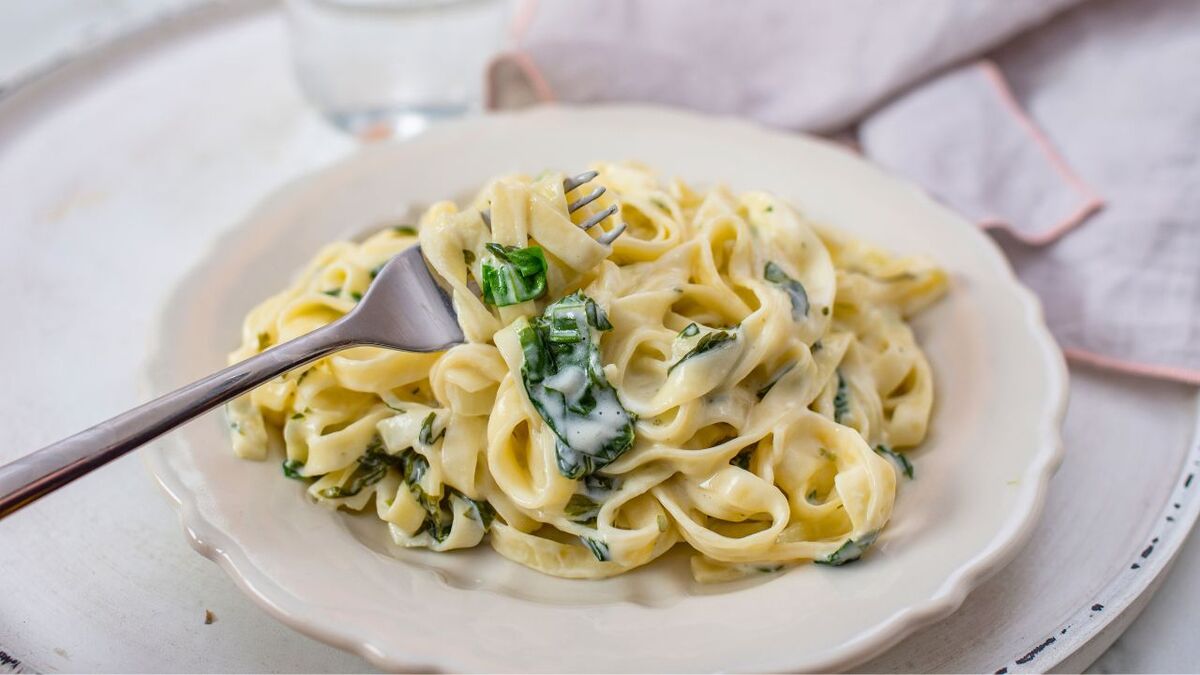
Ingredients:
- 200 g cream cheese
- 1 bunch wild garlic
- Salt
- Pepper
Preparation:
- Wash, dry, and finely chop wild garlic
- Mix cream cheese with wild garlic, salt, and pepper
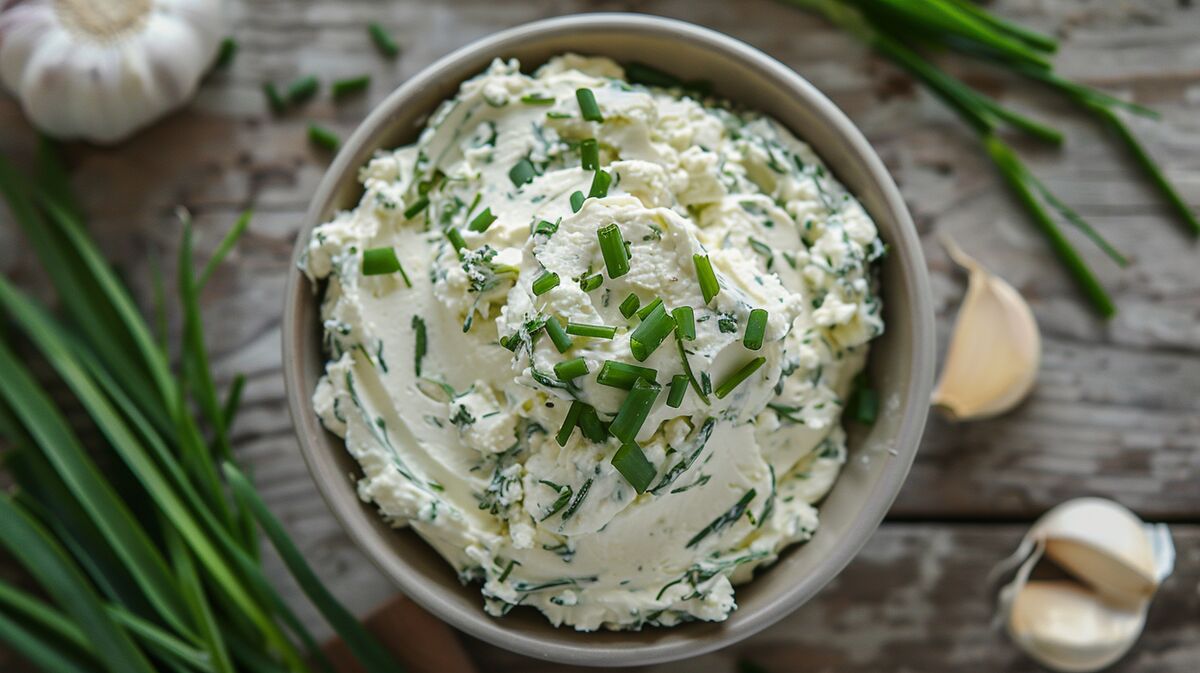
Ingredients:
- 1 kg waxy potatoes
- 1 bunch wild garlic
- 1 onion
- 4 tbsp olive oil
- 2 tbsp white wine vinegar
- Salt
- Pepper
Preparation:
- Cook potatoes, peel, and slice
- Peel and finely dice onion
- Wash, dry, and chop wild garlic
- Mix potatoes, onions, and wild garlic
- Whisk olive oil and vinegar, pour over the salad
- Season with salt and pepper
Ingredients:
- 200 g cream cheese
- 100 g wild garlic leaves
- 2 tbsp lemon juice
- Salt
- Pepper
Preparation:
- Wash, dry, and finely chop wild garlic
- Mix cream cheese, wild garlic, and lemon juice
- Season with salt and pepper
Ingredients:
- 200 g flour
- 200 g natural yogurt
- 1 tsp baking powder
- 1 bunch wild garlic
- Salt
Preparation:
- Knead flour, yogurt, baking powder, and salt into a smooth dough
- Wash, dry, and finely chop wild garlic
- Knead wild garlic into the dough
- Roll out dough thinly and bake in a hot pan on both sides
Ingredients:
- 200 g flour
- 2 eggs
- 1 pinch of salt
- 200 g Ricotta
- 50 g grated Parmesan
- 1 bunch wild garlic
Preparation:
- Knead flour, eggs, and salt into a smooth dough
- Roll out dough thinly and cut into squares
- Mix Ricotta, Parmesan, and finely chopped wild garlic
- Place filling on dough squares, moisten edges with water
- Fold squares together and press edges firmly
- Cook ravioli in boiling salted water for about 5 minutes
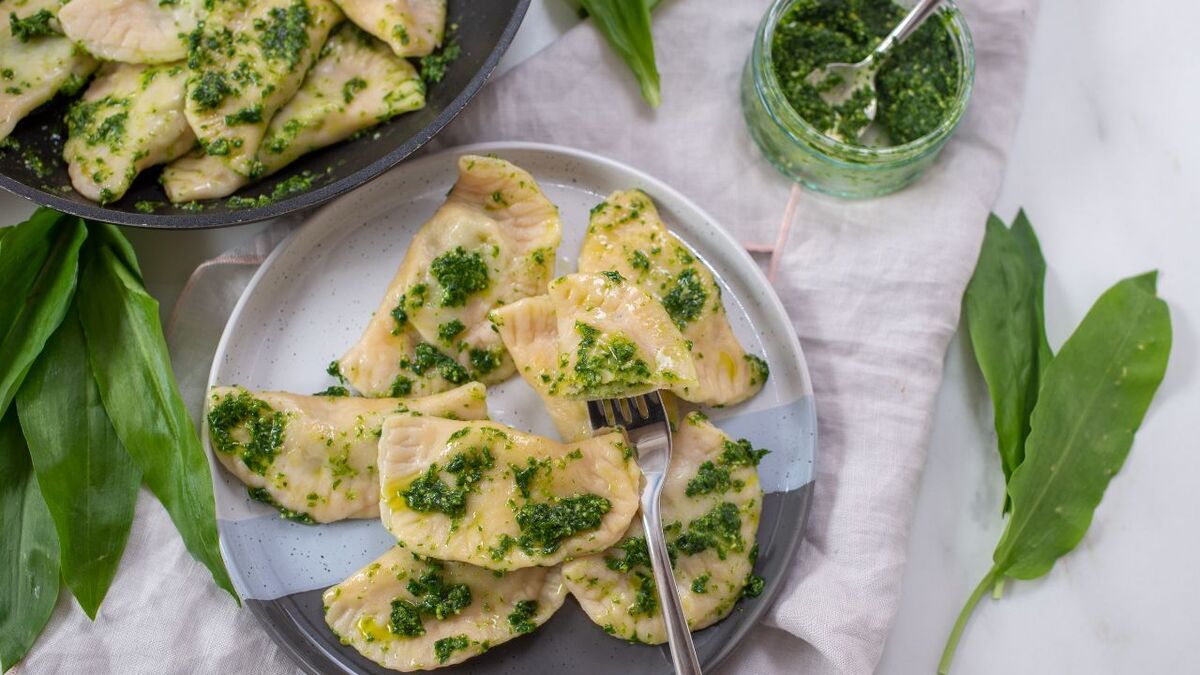
Ingredients:
- 500 g gnocchi
- 1 bunch wild garlic
- 200 g cherry tomatoes
- 1 onion
- 2 garlic cloves
- 2 tbsp olive oil
- 50 g grated Parmesan
Preparation:
- Peel and finely chop onion and garlic
- Wash, dry, and cut wild garlic into strips
- Halve cherry tomatoes
- Heat olive oil in a pan, sauté onion and garlic
- Add gnocchi and fry until golden brown
- Add wild garlic and tomatoes, sauté for 2–3 minutes
- Sprinkle Parmesan over
Ingredients:
- 1 puff pastry
- 100 g wild garlic pesto
- 100 g sour cream
- 2 eggs
- 50 g grated cheese
Preparation:
- Roll out puff pastry and place in muffin tins
- Mix pesto, sour cream, eggs, and cheese
- Fill mixture into the tins
- Bake in a preheated oven at 180 °C for about 20 minutes
Ingredients:
- 4 chicken breast fillets
- 100 g wild garlic pesto
- 2 tbsp olive oil
- Salt
- Pepper
Preparation:
- Wash, dry, and flatten chicken breasts
- Generously coat with pesto
- Heat oil in a pan, fry chicken on both sides until golden brown
- Season with salt and pepper
Ingredients:
- 200 g feta cheese
- 1 bunch wild garlic
- 200 g natural yogurt
- 1 garlic clove
- Salt
- Pepper
Preparation:
- Crumble feta cheese
- Wash, dry, and finely chop wild garlic
- Peel and press garlic
- Mix all ingredients
- Season with salt and pepper
Ingredients:
- 1 ciabatta
- 50 g soft butter
- 1 bunch wild garlic
- 2 garlic cloves
- Salt
- Pepper
Preparation:
- Halve ciabatta lengthwise and bake in the oven
- Mix butter with finely chopped wild garlic, pressed garlic, salt, and pepper
- Spread wild garlic mixture on the ciabatta halves
Ingredients:
- 4 salmon fillets
- 100 g wild garlic pesto
- 1 lemon
- Salt
- Pepper
Preparation:
- Wash, dry, and sprinkle salmon with lemon juice
- Generously coat with pesto
- Place salmon on a baking sheet and bake in the oven at 200 °C
- Season with salt and pepper
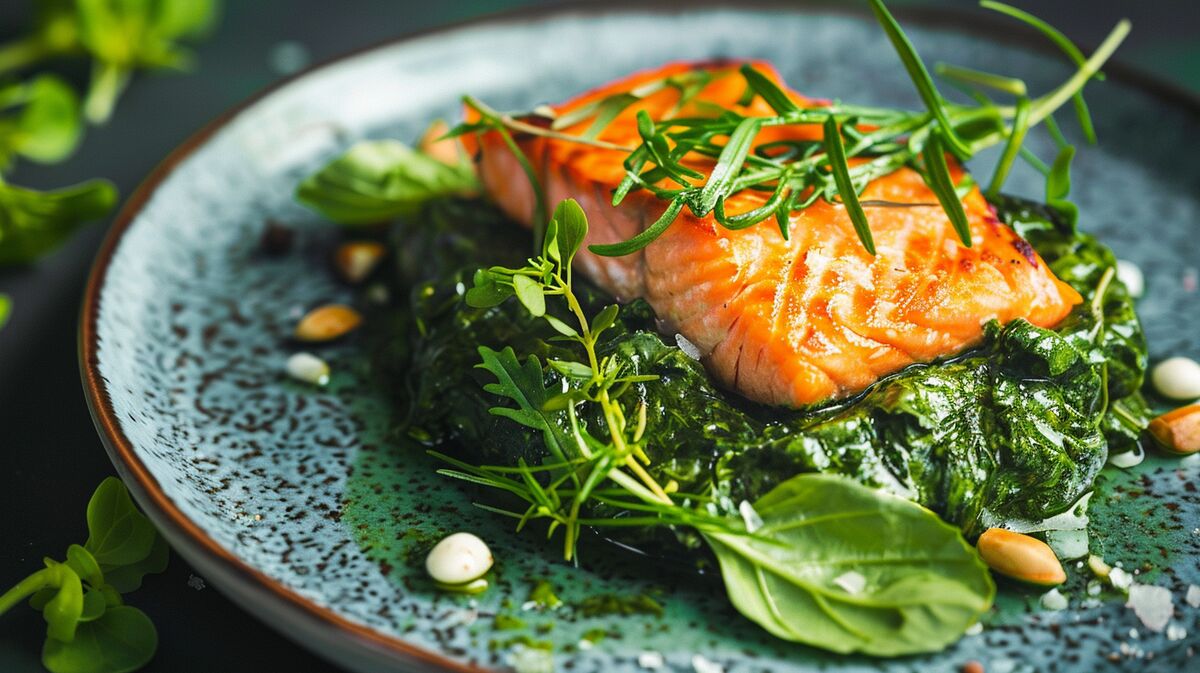
Ingredients:
- 1 bunch wild garlic
- 1 bunch parsley
- 1 bunch of chives
- 1 bunch chervil
- 200 g sour cream
- 2 tbsp lemon juice
- Salt
- Pepper
Preparation:
- Wash, dry, and finely chop all herbs
- Mix herbs with sour cream and lemon juice
- Season with salt and pepper
Ingredients:
- 200 g soft butter
- 1 bunch wild garlic
- 1 tsp lemon juice
- Salt
- Pepper
Preparation:
- Wash, dry, and finely chop wild garlic
- Mix butter, wild garlic, lemon juice, salt, and pepper
- Wrap in cling film to form a roll and refrigerate
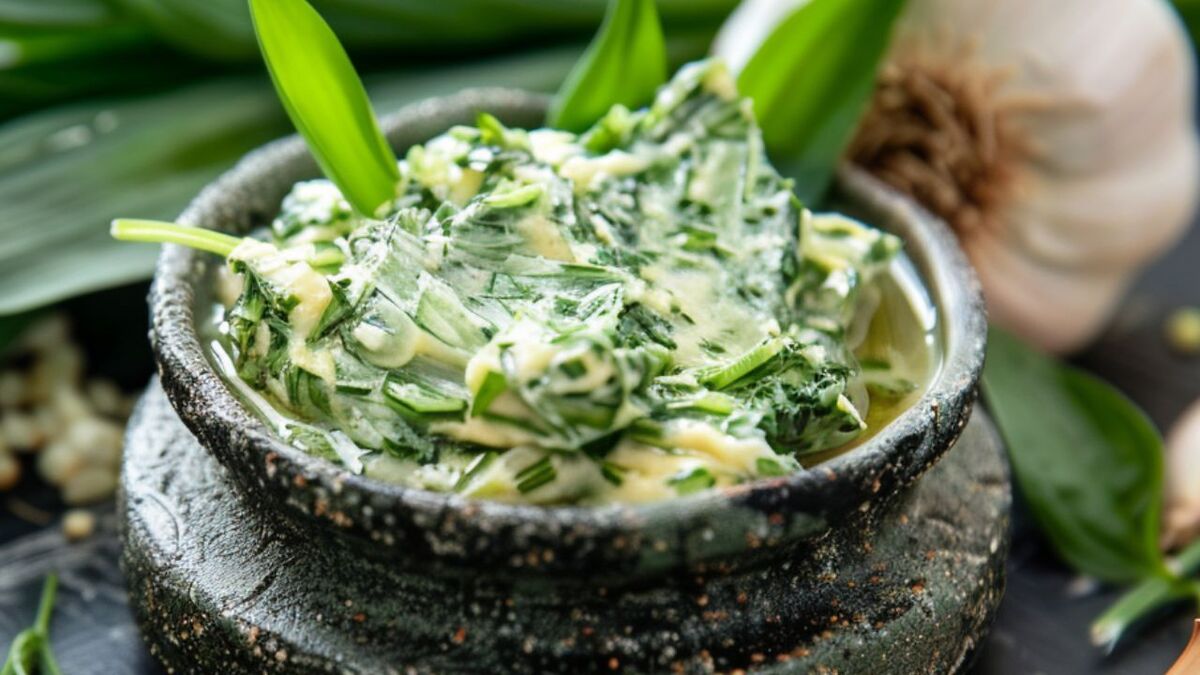
Tips and Tricks
Who doesn't know it: After collecting and processing wild garlic, the fingers still smell like garlic for days.
On the other hand, a simple trick helps: coffee grounds!
Simply rub some of it on your hands with water or dish soap and rinse thoroughly. The strong smell disappears as if by magic.
Furthermore, the typical garlic breath after consuming wild garlic is not everyone's cup of tea.
My tip: Drink espresso or slowly chew on a coffee bean. The essential oils contained neutralize the smell in the mouth.
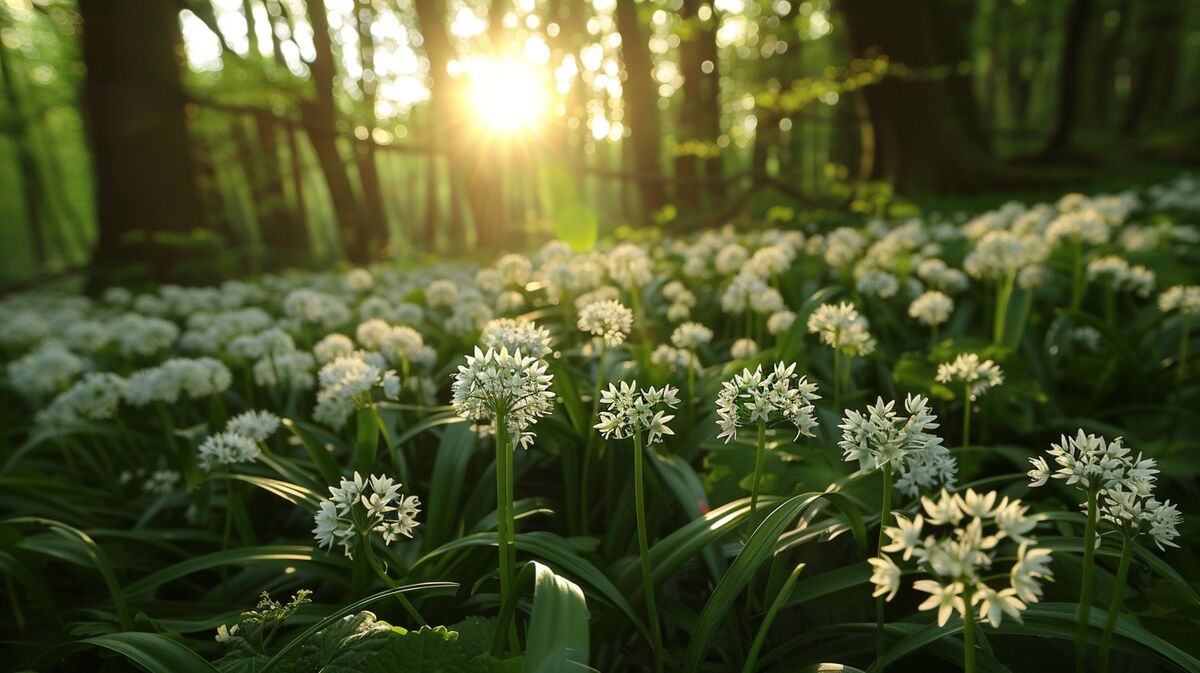
Conclusion: Wild garlic is a true all-rounder
Wild garlic is delicious, healthy, and versatile. With its intense flavor, it enriches our cuisine in spring and at the same time strengthens our body.
By carefully collecting while considering the risk of confusion, we can sustainably use this wild herb. The numerous ways of preparation, from raw to cooked, from pesto to butter, make us creative wild garlic gourmets.
I hope I was able to provide you with valuable tips and inspiration with my wild garlic guide.
Now it's up to you to harvest the green treasures and treat yourself to culinary delights.
And always remember: Wild garlic is not only delicious, but also your green buddy for adventures in nature.
With him by your side, you are practically the Robin Hoods of wild herbs - always on the lookout for the next flavorful treasure!
In this sense: May the garlic breath be with you!


Author of the guide
Martin Gebhardt
Hey, I'm Martin. On my blog, you will learn the basics and numerous details about living in the wild. I think survival, bushcraft and the good life in nature are the keys to happiness. Find me here on Instagram or on YouTube. You can find more about my mission on the About Me page.
Was this guide helpful?
14 people found this guide helpful.
5.00 out of 5 points (14 Ratings)
Comments (0)
This post may contain affiliate links. So if you click on the links and make a purchase, I will receive a small commission at no additional cost to you. Click here, to learn more about it.


